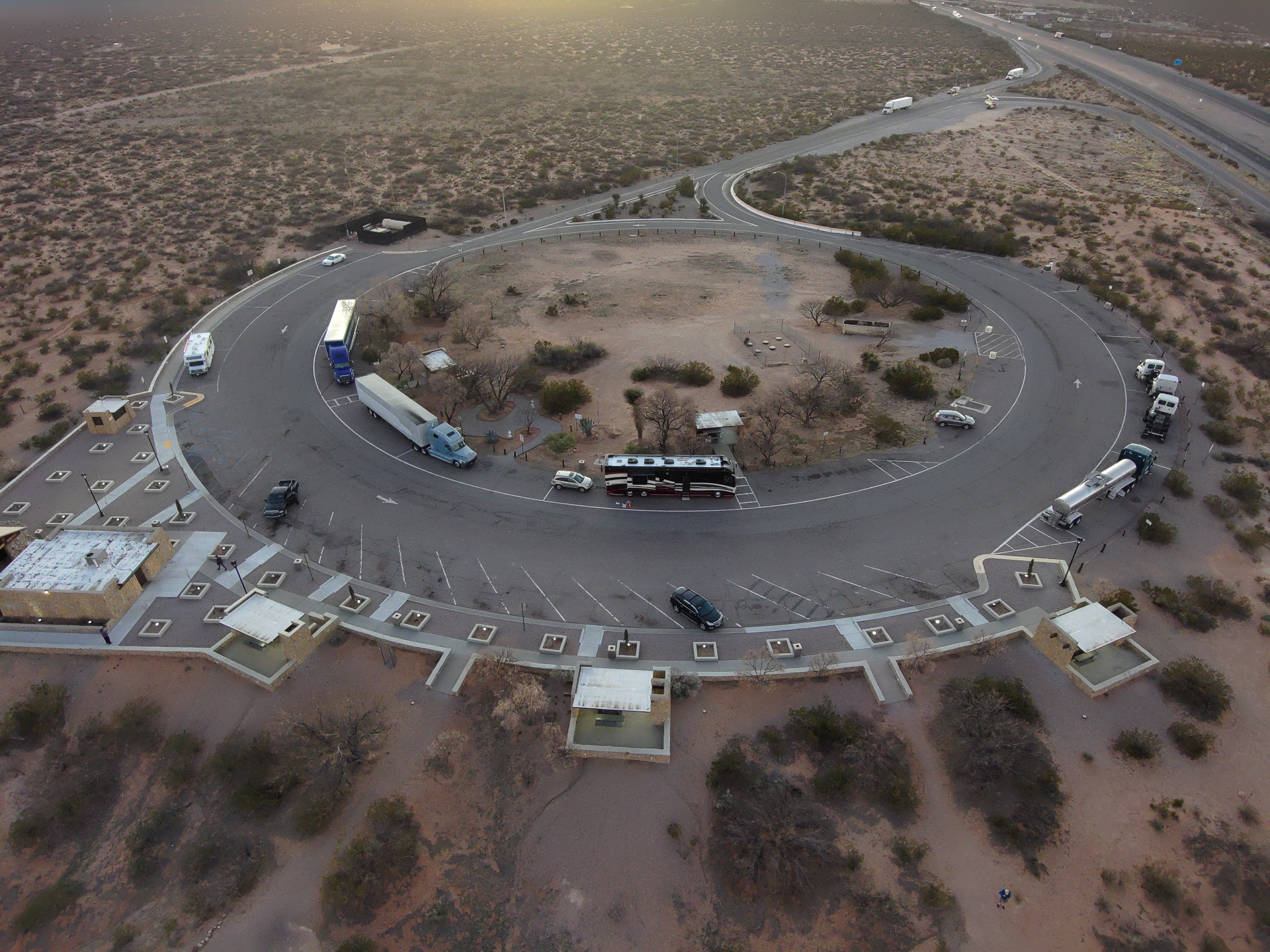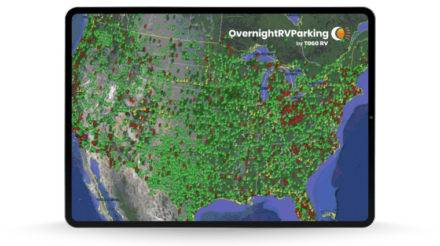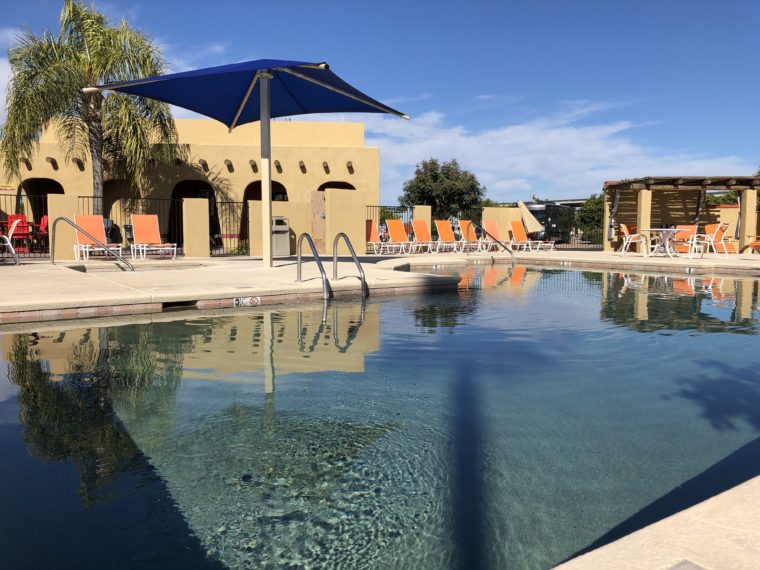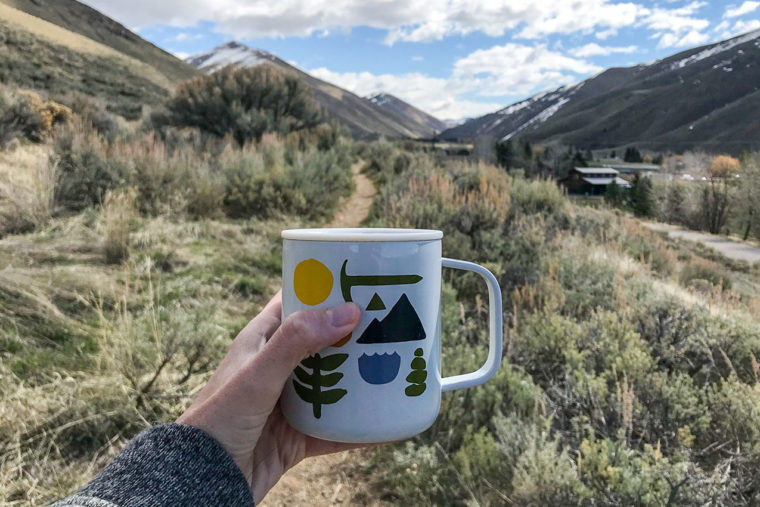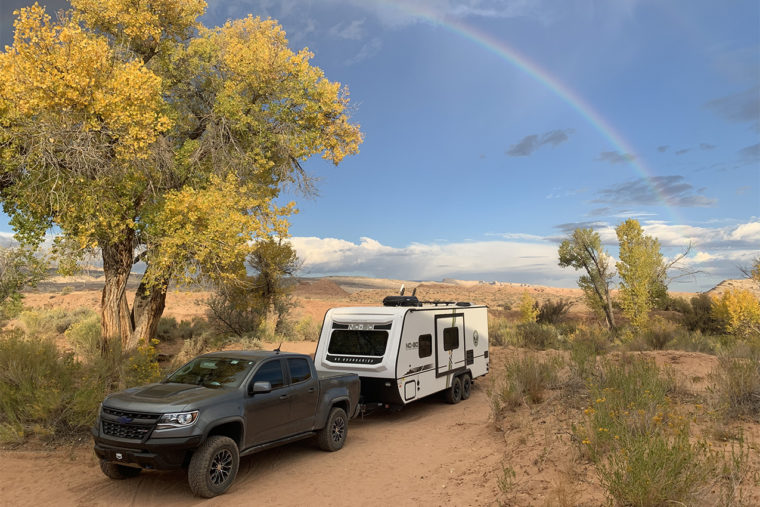Rest stops are parking lots located along major roads or highways, designed to give travelers a place to get out of their vehicles, stretch, and use the bathroom. Some have visitor centers, mowed lawns, public WiFi, and heated facilities, while others have outhouses and a little patch of roadside brush for vegetation. No matter what they look like, they all have one goal in mind—giving you a place to take a break.
Around the U.S., some (but not all) states allow overnight parking at rest stops. Here’s your ultimate guide to overnight parking at rest areas, including what overnight parking is, where to find it, and what you need to know before you go.
How to Find a Safe Place to Park Your RV or Van for the Night
What Overnight Parking Is and Isn’t
Most rest areas that allow overnight parking specifically say “no camping.” To those of us who travel in our RVs, this feels like a mixed message. How can I park overnight but not camp?
While the definition of this isn’t set in stone, here’s our general take: Overnight parking is pulling your RV into a rest stop parking lot, shutting down your engine, taking your dog (on a leash) for a bathroom break, and then crawling into bed. In the morning, you brew your coffee, toast a bagel, and hit the road.
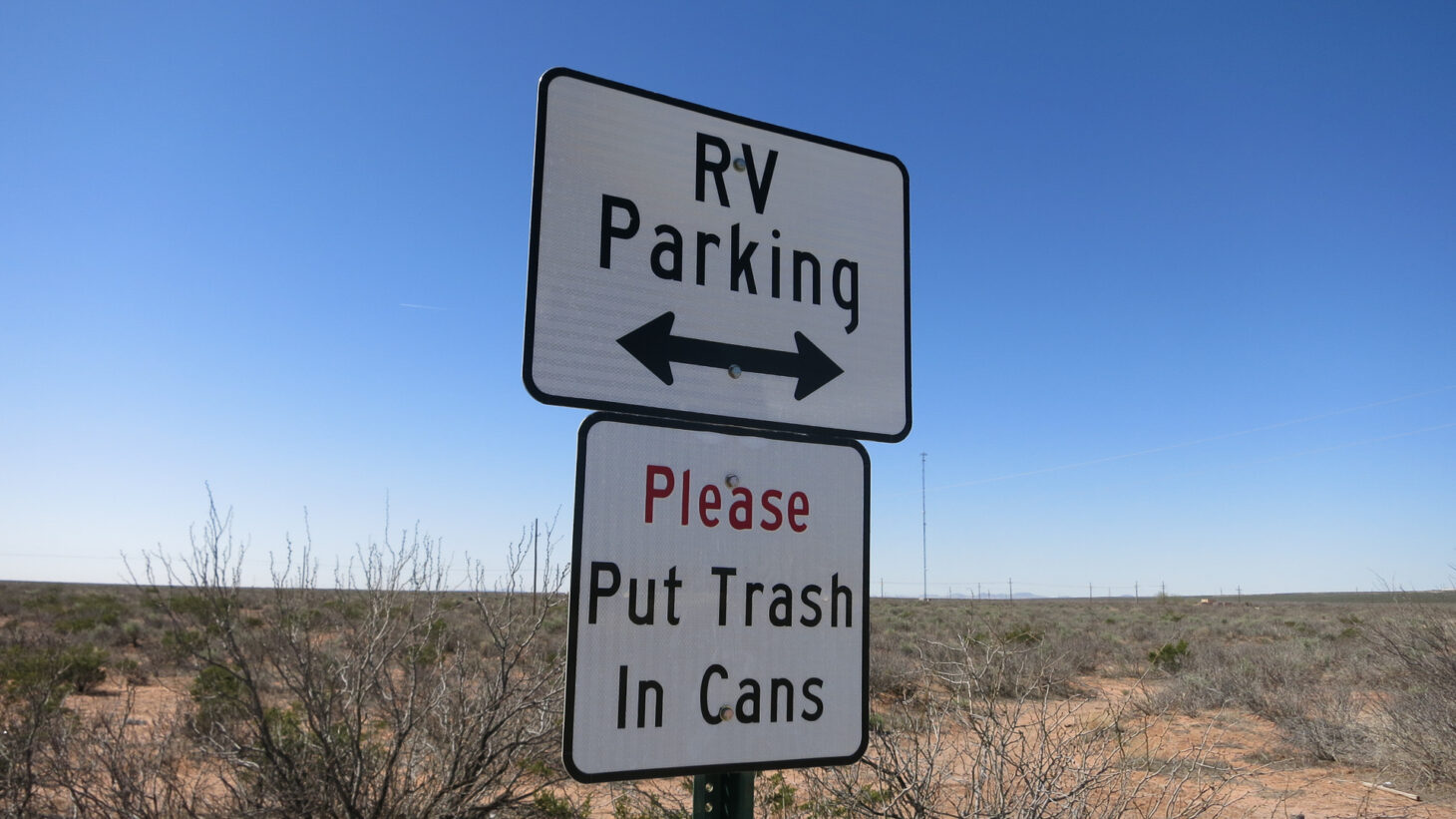
Camping, in contrast, is making yourself at home—extending your slide-outs and jacks, unhooking your travel trailer, grilling a tasty dinner on the barbecue, and setting up camp chairs outside. It’s a leisure pursuit as opposed to the necessity of taking a break from travel to sleep. With overnight parking, the goal is to get back on the road as soon as you’re rested.
What You Need to Know About Camping at a Love’s Travel Stop With RV Hookups
How to Overnight Park in an RV
You’re probably thinking, “If I can’t put out my slide-outs and unhook my camper, how complicated could it possibly be?” But there are a few best practices you’ll want to follow for a peaceful night’s sleep in a rest area. Always follow posted regulations at specific locations.
Do your best not to park in spaces used by truckers. Commercial truckers have to follow a stringent set of rules and regulations about how long they can drive and how long they need to rest. If they violate these rules, they face steep fines and career-damaging marks on their driving records.
Unlike campers, truckers are also restricted in where they can stay. If you pull into a crowded rest stop and take the last semi spot, there’s a good chance that you’re going to hear about it, and not in an amicable way. Besides, who wants to camp sandwiched between two semis that run their engines all night? Leave trucker spots for the truckers.
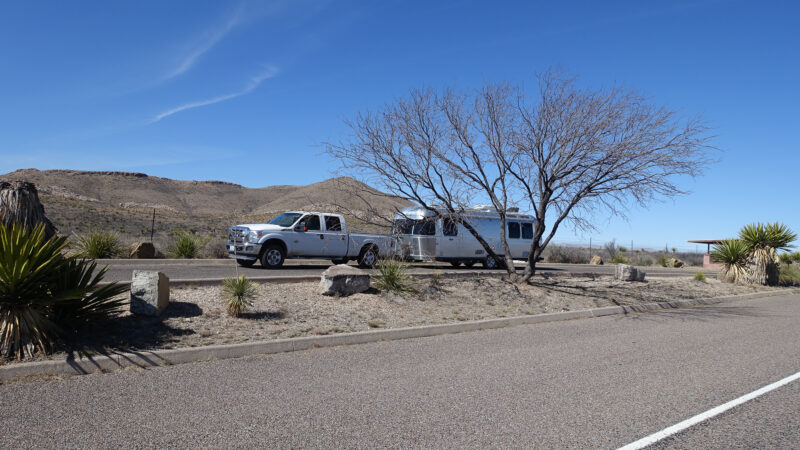
Trust your gut. In addition to reading reviews of rest stops on Campendium, take stock of a rest area when you pull in. Is it well-lit? Are there any other RVs or trucks in the lot? Does it feel safe, or is your spidey sense going off? Your safety is in your hands when staying at a rest stop, and often, the nearest town is miles away. If anything about it makes you uncomfortable, move on.
Get comfortable (inside). You definitely don’t want to make yourself at home in a rest stop, but at the same time, it doesn’t have to be your worst night’s sleep. Park as far away from the road (and semis) as you can to reduce the nighttime noise, and place Reflectix in your windows to help block the light. A white noise machine or earplugs can help drown out even more noise, though you don’t want to eliminate all sounds—if someone pulls off the highway and wants to snag the bikes off your bike rack, you’ll want to hear it.
No tents or hammocks. We have yet to find a rest area that allows people to sleep outside of their vehicles. That means no tents and no hammocks during your stay.
States That Allow Overnight Parking in Rest Areas
Not all states allow overnight parking at rest areas, and most rest areas are patrolled frequently enough that you’ll likely get fined if you try. Here’s a list of states where you can legally park overnight:
California: You’re permitted to stay overnight for a maximum of 8 hours at California rest stops that are open 24 hours daily. There’s no camping, and you must be inside your vehicle during your stay.
Delaware: This small state allows overnight parking at its two rest areas. Generally, camping isn’t allowed, and there are posted time limits for parking at the Smyrna Rest Area for 6 to 8 hours.
Georgia: The state allows for “normal, customary, and temporary use of safety rest areas, welcome centers, tourist centers, and other property… specifically designated for purposes of resting, sleeping, eating, or other similar activities by persons traveling by vehicle.” There are no defined time limits at rest areas, but camping isn’t allowed.
Idaho: In Idaho, you can park at an interstate highway rest area for up to 10 hours, and you can park in a rest area on other state highways for up to 16 hours. The rules state that it’s prohibited to camp or occupy a rest area “for any purpose other than rest and relaxation from the fatigue of travel.”
Iowa: According to signs posted at Iowa rest areas, you can remain parked for up to 24 hours for reasonable justification, including the need for rest. Camping is prohibited.
Kansas: Overnight parking is allowed in Kansas rest areas for 1 night only. No camping.
Mississippi: Mississippi allows overnight parking for safety and rest but not for recreational camping. Vehicles can park for up to 8 hours.
Missouri: Rest your head for a night at a rest stop in Missouri, where overnight parking is permitted at rest areas.
Nebraska: Catch a few winks at any of Nebraska’s rest areas along Interstate 80, which allow vehicles to be parked for up to 10 hours. No camping allowed.
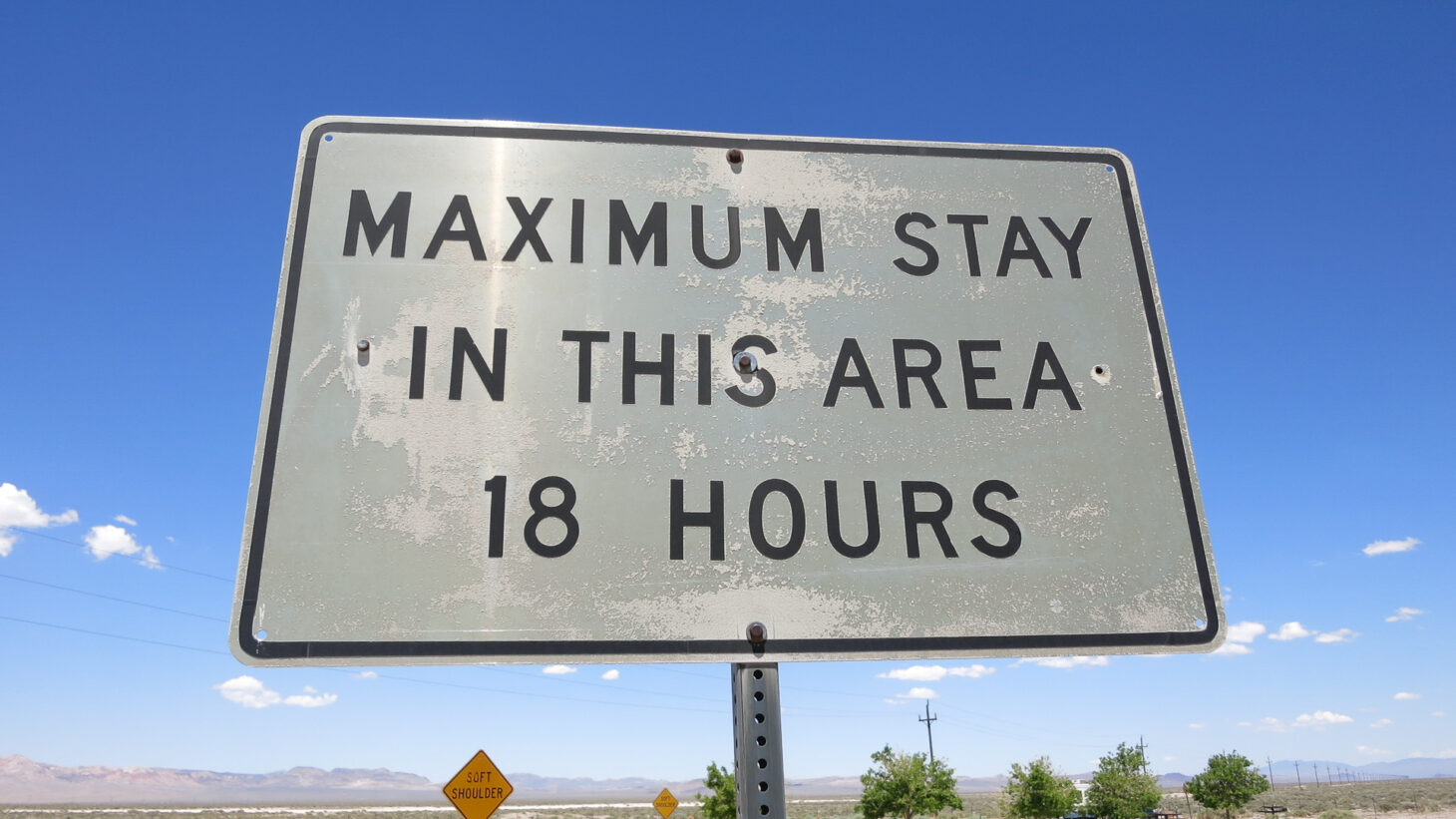
Nevada: Nevada allows vehicles to park for up to 18 hours (in a 2-week period) at rest areas, some of which even have dump stations for RV use and/or designated overnight RV parking spots.
New Mexico: The Land of Enchantment wants you to stay rested and relaxed while on your journey. The state allows vehicles to park at rest stops for up to 24 hours in any 3-day period.
North Dakota: North Dakota allows overnight parking at rest areas, and many of them offer water and free WiFi, too.
Ohio: Ohio doesn’t allow overnight camping at rest areas, with the exception of eight service plazas on the Ohio Turnpike. These eight service plazas welcome RVs up to 40 feet long to overnight park (and plug in) for a fee. The sites are all first come, first served.
Oregon: Oregon allows travelers to rest up to 12 hours at highway safety rest areas. No camping is allowed.
Pennsylvania: There’s a 2-hour (or other posted) time limit within a 24-hour period at rest areas and welcome centers managed by PennDOT—camping isn’t allowed. Turnpike service plazas managed by the state’s Turnpike Authority allow parking for up to 24 hours.
Texas: Texas knows that its highways are long, flat, and can get a little snoozy. The state allows overnight parking for up to 24 hours at all rest stops; no camping is allowed.
The Best Texas Rest Areas for Overnight RV Camping
Utah: Utah law states, “All rest areas are posted for no overnight camping. However, extended stays are permitted and are monitored by the on-site staff and the Highway Patrol.” So, get that rest, and then get moving.
Washington: You can stay up to 8 hours in a Washington rest area, many of which offer free coffee to help keep travelers caffeinated and alert. No camping is allowed.
West Virginia: Overnight parking is allowed for RVers at West Virginia’s travel plazas, and most have a designated area for large vehicles.
Wyoming: Wyoming doesn’t allow overnight camping at rest areas but permits longer naps (with no time limit) if you need one. Just be sure to stay inside your vehicle and keep your slides in.
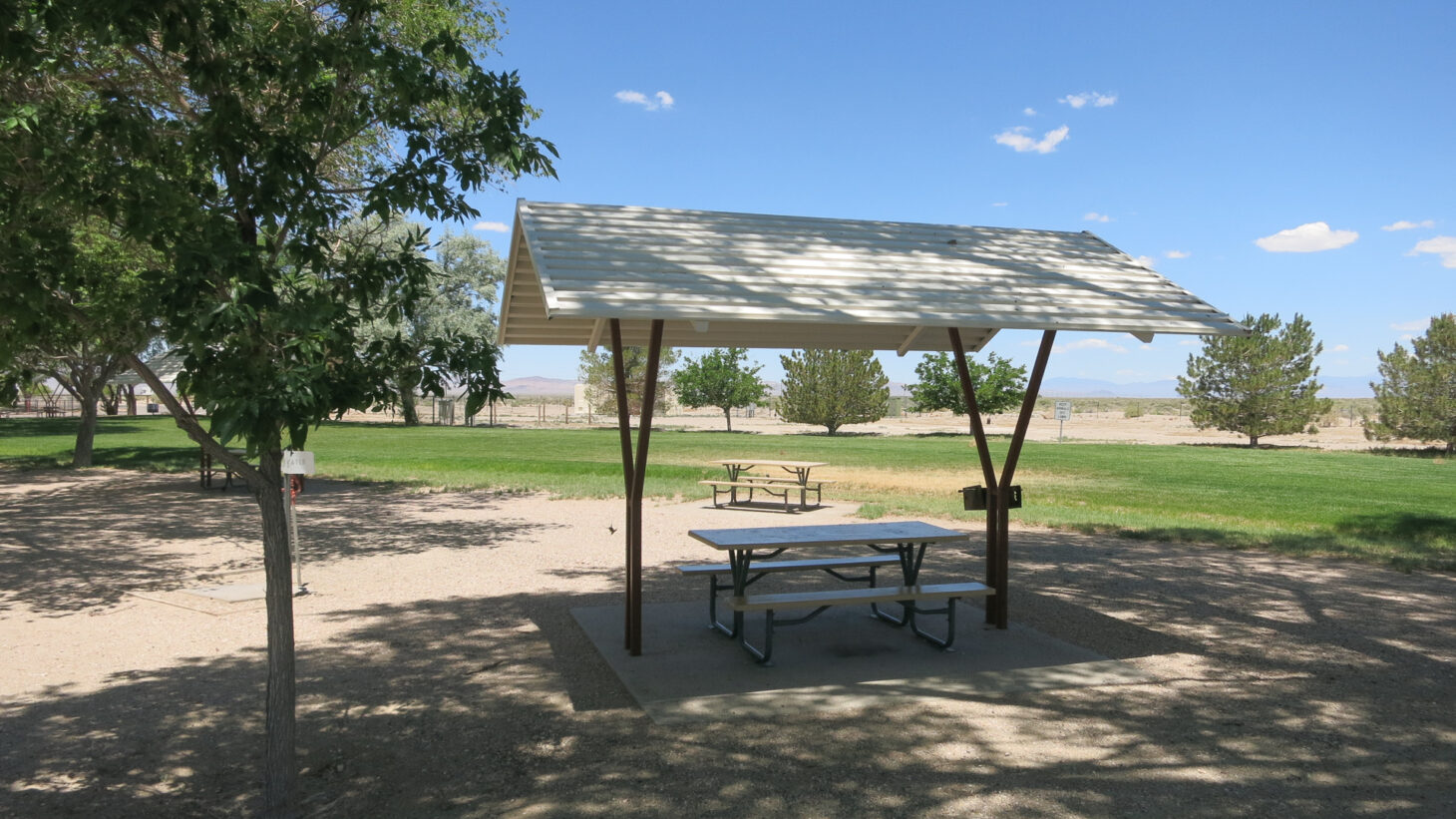
Other States’ Rules on Overnight Parking at Rest Areas
Alabama, Alaska, Arizona, Arkansas, Connecticut, Indiana, Louisiana, Massachusetts, Maine, Michigan, Montana, New Jersey (with restrictions at specific locations), New Hampshire, Oklahoma, Rhode Island, and Wisconsin don’t have statewide laws or regulations about overnight parking at rest areas. In these cases, pay special attention to any posted signs, as rules can vary, but you’re likely okay to stay overnight in your vehicle unless otherwise posted. Note that most of these states strictly prohibit camping, though.
Florida, Illinois, Kentucky, Maryland, Minnesota, New York, South Dakota, and Tennessee allow parking with time limits (between 2 and 4 hours) at rest areas. Check each state’s regulations, so you don’t overstay your welcome. However, rest areas are designated for rest, so if needed, you could do so inconspicuously at your discretion for longer. Generally, camping is not allowed.
States that explicitly don’t allow overnight parking (or camping) include Colorado, North Carolina, South Carolina, and Virginia. Again, rest areas are designated for rest, so if truly needed, you could do so at your discretion for a short period of time—without drawing attention to yourself.
